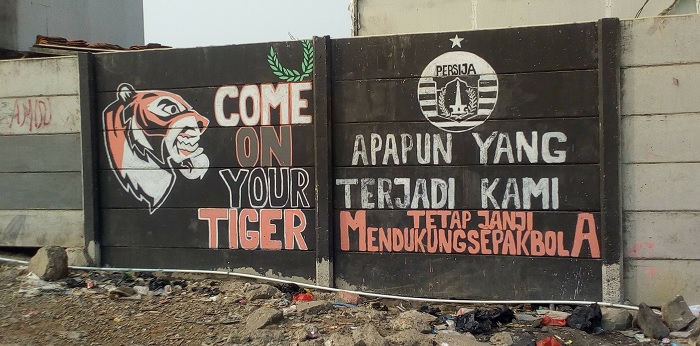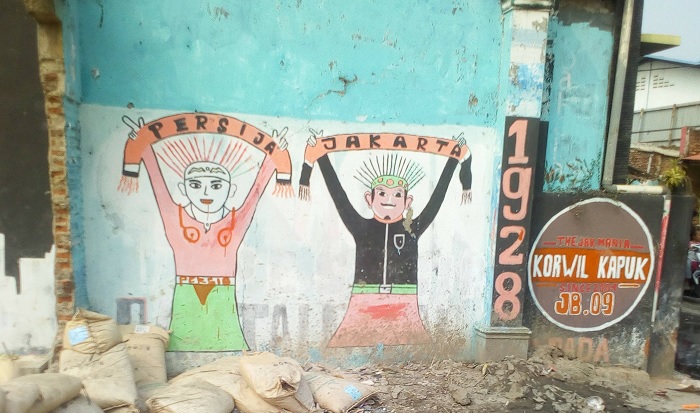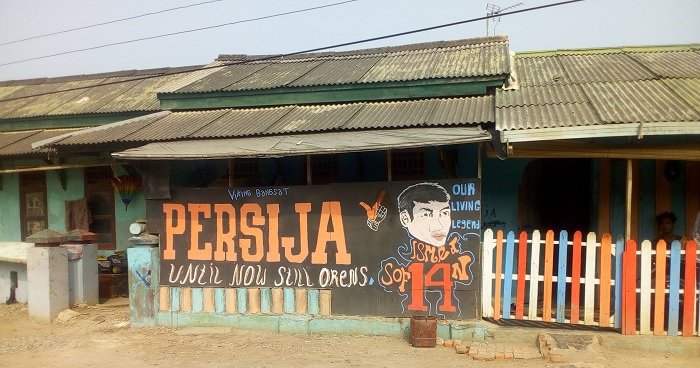Jakarta’s fan club provides members with a stage for their city pride, but could achieve more for football
Jakarta’s football team, Persija, is known for its lurid orange jerseys and its supporter group – Jakmania. The Jak, as they are also known, are prone to getting into fights (tawuran) and causing traffic jams near the stadium or on the highway between Jakarta and Bandung. Those who actively supporter Persija are a minority in Jakarta’s large and diverse population of some 10 to 15 million, though it is nonetheless important for local politicians to actively demonstrate their support for the club. Governors Sutiyoso, Ahok and now Anies Basweden have all aligned themselves to varying degrees with Persija. Most recently, Anies has frequently shown up at games and announced his plans for Persija’s new stadium with comments via Instagram.
Founded in 1928, Persija is one of Indonesia’s oldest football clubs and was a founding member of the Persatuan Sepak Bola Seluruh Indonesia (PSSI, Football Association of Indonesia). The Jakmania have some 80,000 members and an intense and violent rivalry with the Bobotoh and Viking supporter groups of Persib Bandung. The violence between the two supporter groups is not restricted to game days: Persib fans wear their blue-supporter gear at their peril if in Jakarta.
Persija’s ‘home ground’ has changed many times. The football team played their earliest games at the Lapangan Merdeka, but since then has had home bases in Menteng (at the since demolished Stadion Menteng), at Stadion Lebak Bulus in the city’s south, and at the Gelora Bung Karno sports complex in central Jakarta. All of these facilities have been problematic to varying degrees. During the Gelora Bung Karno renovations for the upcoming Asian Games, Persija was forced to play its home games in distant Solo at Stadion Manahan. They have become, according to one news report, the ‘macan yang tak berkandang’: the tigers without a den.
For the Jakmania, this is no impediment. Large groups of fans travel great distances to follow their team, sometimes choosing to simply hang out with their friends outside of the stadium during the game. One of Jakmania’s leaders, Ferry Indrasjarief, stated that for the fans, identifying with the team ‘was all they have … it gives them happiness’.

The Jak
On game days in Jakarta, it is not uncommon to see convoys of mini-buses and motorcycles full of orange-clad youth, waving flags, blowing improvised trumpets and occupying the crowded streets of the nation’s capital. Jakmania wave flags with the official logo of Jakarta on it, as well as draw on tiger-related iconography, as Persija’s nickname is ‘Macan Kemayoran’, ‘The Tigers of Kemayoran’. The Jak members are mostly young men, aged from 15 to 25 years who come from across Jakarta and the satellite suburbs and cities of Bekasi and Depok.
Regular police raids on their convoys uncover weapons. In negotiations between the police and the Jakmania ‘administration’, supporters are regularly sanctioned for not being registered with the central Jakmania fan club. ‘We have rules – every time a bus leaves, we inspect first what people are taking to the game’, a group leader, Pandu, told Kompas . ‘We make sure that they’re really going to the game to watch it, rather than cause trouble’. The games become an opportunity to hang out in and around the stadium: football and the identity of being ‘a Jak’ is a means of occupying and creating a noisy and lively space in the city.
Jakmania’s intense rivalry with the Bobotoh and Viking fan groups of Persib Bandung attracts close monitoring by police. Rival fans infiltrate other groups by wearing the opposing team’s kit. The frequent eruption of violence between the rival fan groups means that games are sometimes not given police permission to take place. It is even recommended that games between the two clubs take place outside of West Java, or even outside Java altogether. Attacks are frequently made on cars with number plates indicating their city of origin – whether ‘B’ (for Jakarta), or ‘D’ (for Bandung). It is not unusual for more than 40 bus loads of Persib fans to make the trip to Jakarta for games. Journeys are made at night, yet are still susceptible to attack.

Social media and a fan diaspora
Football clubs are slow to update their websites and are unable to keep up with the rapid flows of information. Social media fills in the gaps. Fans’ posts on Instagram, Twitter and Facebook offer highlights of games shot from the stands, violence, excerpts of news stories documenting fan rivalries and, of course, memes mocking the team’s main rivals.
Videos also show the intense chanting of fans at games, which forms a kind off-field competition between supporter groups to see who comes up with the most spectacular performances. Account names indicate pride in either being ‘independent’ or ‘official’ and cover a range of interests: documenting which players are in or out of the team, or serving as virtual shops which promote unofficial Persija and Jakmania related merchandise.
Despite conspicuous support, it seems Persija and its Jakmania are expendable elements in politicians’ claims to identify with the urban poor and the aspirations of a broad demographic. Promises of a new stadium are yet to materialise. Allowing Persija to play at Gelora Bung Karno is an easy and inexpensive gesture, even if it does pose some threats to urban order. The Jakmania, as a fan base, has the power to shape the continual and gradual improvement of their club’s situation and of the management of football in Indonesia. Yet, the frequent violence which mars so many games damages their aspirations.
Nindia Satiman (nindiasatiman@gmail.com) is a lecturer at the Graduate School of Global and Strategic Studies at Universitas Indonesia. She lives in Jakarta and supports Persija.
Andy Fuller (@readingsideways) is a freelance researcher and editor. His research interests include sport, literature and urban culture. Andy blogs at Reading Sideways and Reading Sideways Press.












